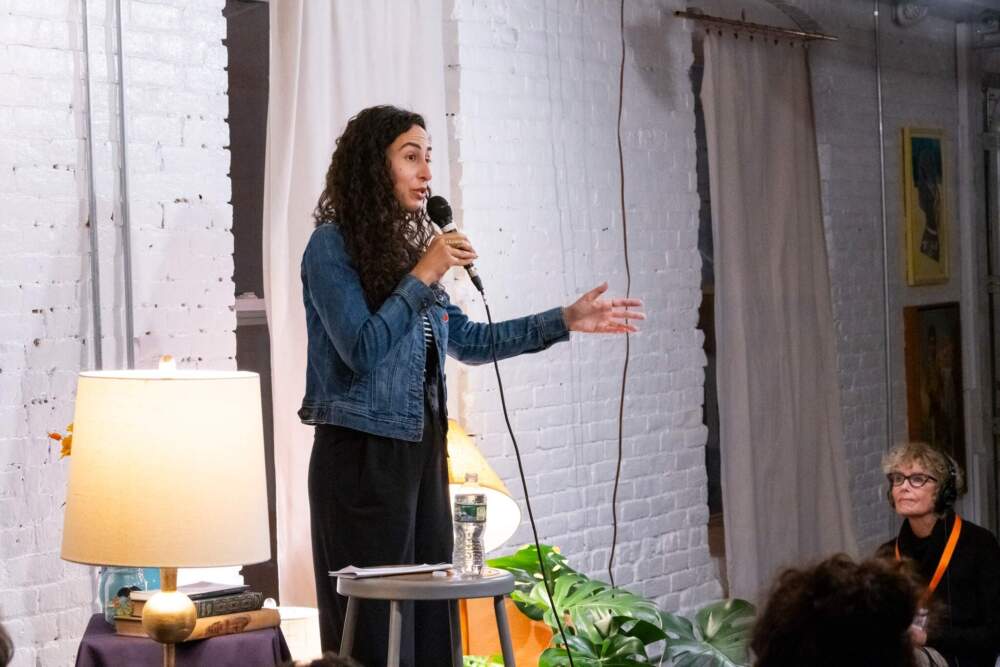Advertisement
Palestinian American comedian Atheer Yacoub explores life as a Muslim woman through humor

Palestinian American comedian Atheer Yacoub hasn’t changed her material since the start of Israel’s war in Gaza.
The war brought the conflict between Israel and Palestinians to the forefront for many people, but Yacoub says it’s nothing new to her community. She’s been talking about it since she started doing stand-up.
Yacoub’s family fled the West Bank after surviving a bombing in 2000. They arrived in Alabama in the summer of 2001, months before the Sept. 11 attacks. Yacoub was the only Muslim at her school.
“My goal is just to express my personal experience growing up in Palestine and in Alabama as a Muslim woman,” Yacoub says. “You don't have to be Palestinian or Arab or Muslim to relate to the things that I talk about.”
Yacoub recently performed at The Jar in Somerville, Massachusetts.

3 questions with Atheer Yacoub
How do you approach the war in Gaza in your comedy?
“I feel a little bit of an aversion, to be honest, to the word ‘war.’ It implies two equal and opposing sides, but it's not Muslims against Jewish people. It's an occupation, and I've lived through it since I was a child.
“I was bombed. I survived. I grew up in Ramallah, which is in the West Bank and my family, our house, across the street got bombed and parts of the missile hit our house in I want to say about 2000. And then in 2001, we moved back to Alabama.
“I've lived there throughout my childhood until about middle school, high school. So I know firsthand what it's like to experience and what I'm seeing now is very triggering and I talked about PTSD on stage and I'm noticing the reaction now is more visceral for people.
“So that's been interesting, people's reactions to certain jokes that I've done before, sometimes more pity rather than like laughter.”
Why don't you mention on stage that your family had been bombed?
“I think I haven't really processed it now that I'm watching what's going on. I just started seeing an EMDR therapist. EMDR is a type of trauma therapy. It's called eye movement desensitization and reprocessing and it helps you reprocess and rewrite kind of traumatic memories. I've heard a lot about it for PTSD.
“So that's something that I just started doing because it's a deep-seated trauma that it's hard to make funny when it's something that I constantly have a visceral reaction about, like fireworks or loud noises, doors slamming.
“It's not funny. As I'm saying it now, I'm like, it's not funny. So it's hard to make that into something when I have even processed this thing living in my body. I'm being re-triggered every time I open Instagram. I'm seeing those terrified faces. I'm seeing the shaking. I'm seeing like the physical reactions that I experienced and still experience even when I just, again, hear a noise. It's hard.”
Advertisement
Is comedy your way of getting at some of the trauma?
“Yeah, I mean, being on stage is definitely more empowering and it allows me to talk about things through the lens of humor versus, ‘Here is my trauma dump.’ There's just something more freeing when you're up there.
“I just want people to remove any kind of preconceptions that they have about Arabs or Muslim women. You know, not everyone is conservative. And even if you are, or you're practicing, it doesn't mean that you're this or that we're not a monolith.”
Michael Scotto produced and edited this interview for broadcast with Todd Mundt. Allison Hagan also adapted it for the web.
This segment aired on May 8, 2024.
